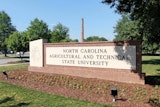 High school senior Jordan Stearns is a participant in the Physician Scientist Training Program.
High school senior Jordan Stearns is a participant in the Physician Scientist Training Program.Against the backdrop of a national imperative to address projected shortages of underrepresented minorities earning degrees in STEM, universities throughout the country are using summer downtime to offer programs that expose youth to the sciences. From hands-on science to engineering and robotics camps to specialized STEM career programs, universities throughout the country are targeting minority students in order to fill the pipeline—even before they enter college.
Sixteen-year-old Jordan Stearns is among an elite few who is benefiting from summer programs that provide academic and experiential training, giving him a competitive edge. Stearns, a senior at Maret High School in Washington, D.C., has participated in the Physician Scientist Training Program every summer since seventh grade. Held at Southern Methodist University, the program follows students through college and offers academic training to prepare students to work in biomedical research. After students complete the middle school portion of the program, they spend high school and college summers working in university, U.S. government and private research laboratories.
This year, Stearns is spending eight weeks at the National Institutes of Health in Bethesda working with senior scientists and their team.
“I am working in a lab on leukemia cells and nuclear extractions, charting out the proteins’ replication origins,” says Stearns, who plans to become a physician. “Eventually, we are hoping to inhibit proteins and stop replication of leukemia cells.”
The program, which is in its 24th year, was created by Dr. Moses L. Williams after working as director of admissions at the Temple School of Medicine for 18 years.
“STEM and medicine are among the highest paying jobs, and yet, to occupy those positions, you must be qualified.” Williams says. “That cadre is not available. They have not been nurtured.”
He adds, “Our program is a new paradigm of following students for 10 years starting in seventh grade. The demographics are changing and the majority of the citizens will be of color. As a result of the emerging majority, we want these kids to have the highest paying jobs, which are in science, technology, engineering and math.”
Williams says 83 percent of the program’s graduates from 1998 to 2011 have earned terminal degrees. Some of the universities that partner with the Physician Scientist Training Program include Southern Methodist University, Drexel, Thomas Jefferson University, the University of Pennsylvania and the Philadelphia College of Osteopathic Medicine, the University of Washington, the University of Texas Southwestern and the University of Toronto.
According to the National Action Council for Minorities in Engineering, preparation is a key ingredient to solving the problem of continued STEM shortages. In the 2011 NACME Data Book, Dr. Irving McPhail, NACME president and chief executive officer, identified the low number of minorities in high school taking rigorous science, technology and mathematics courses, making them unprepared to enter college engineering programs. These dismal numbers have served as an impetus for early exposure and preparation through STEM summer programs.
Though most universities have traditionally filled the summer lull with some degree of pre-college activities, the environment of federal budget cuts, withering state appropriations for public universities, declines in parent loans, rising interest rates and tuition hikes have left universities seeking for ways to boost their bottom lines. Instead of massively cutting summer programs, universities have been able to generate revenue through summer offerings, which include STEM, academic preparation, hobby activities and sports. These can range from grant-funded programs that are free to participants, to those costing a couple hundred dollars a week, or several thousand for a two- or four-week experience.
For example, the Ohio State University is home to one of the largest camp programs in the country. Among its 130 camps that generate about $3 million in registrations each year for the university, under STEM, there is a robotics day camp for grades one through six, three day camps and two residential programs for middle schoolers, and two day camps and five residential programs for high school students.
“Summer camps are an effective way to pique the interest of young students in STEM,” says John Lock, former CEO of Project Lead The Way, a nonprofit provider of STEM curricular programs to middle schools and high schools across the U.S. “The younger they get hooked, the more likely they will stick with it during high school and college, which will help prepare them for success in today’s 21st-century global economy.”
There are numerous programs throughout the country with the goal of early introduction and preparation to STEM fields, including the U.S. Naval Academy, University of Maryland, Georgia Institute of Technology, Stanford and USC.
The Massachusetts Institute of Technology’s (MIT) Office of Engineering Outreach Programs in the School of Engineering runs seven programs for middle and high school students. In 1975, it launched the Minority Introduction to Engineering and Science (MITES) Program to address the low numbers of minority students pursuing advanced technical degrees.
MITES offers three rigorous residential and online academic enrichment programs for promising high school juniors who are interested in studying and exploring careers in science and engineering. These programs include MITES, E2@MIT (Engineering Experience at MIT), and MOSTEC (MIT Online Science, Technology and Engineering Community). The national programs are open to students from diverse populations to pursue higher education and careers in these fields.
In Atlanta, Morehouse College is keeping their campuses bustling during the summer months. Morehouse offers a broad spectrum of summer programs, including the Pre-Freshman Bridge Summer Science Program and the J.K. Haynes Summer Science Program for High School Students.
Dr. Willie Rockward, chair and associate professor in the Department of Physics & Dual Degree Engineering at Morehouse, sees the summer as an opportunity to fill the pipeline for the future.
Rockward runs the Morehouse Nuclear, Materials, Space Sciences (NuMaSS) Summer Program, which offers a free, four-week experience for rising seventh to 11th graders who have a desire and/or aptitude to pursue an undergraduate degree in STEM. The science program caters to high school students in the Atlanta Metropolitan area and is sponsored by NASA Georgia Space Grant, Nuclear Regulatory Commission and the Department of Physics. The number of minorities pursuing degrees in physics has traditionally been extremely low, and Morehouse has been working to change that.
“Morehouse is one of the top producers of minorities with B.S.s in physics,” says Rockward. “Our vision for the next five to seven years is to triple that number to 45 graduates a year. In order to achieve this goal, we need to have a strong pipeline of qualified and motivated students.
“Programs like NuMaSS serve as a major recruitment tool where we can get an early chance to work with students to not only choose Morehouse or other Atlanta University Center consortium (AUC) schools, but we hope that they will also choose to major in physics and engineering,” adds Rockward.
At North Carolina A&T State University, Dr. Stephanie Luster-Teasley and Dr. Radiah Minor created the Girls in Science Lab Summer Experience this year to ensure that girls coming from Title I schools could understand their potential and the opportunities available to them in STEM. Targeting seventh- and eighth-grade girls, the free, hands-on engineering and science lab camp offer participants the opportunity to be involved in case study based on laboratory experiences related to environmental hazards, biology, chemistry and engineering.
“A lot of the girls were able to see that college is attainable,” says Luster-Teasley about the program funded by the Burroughs Welcome Fund and North Carolina A&T State University. “The girls loved being in the lab.”
“We are really interested in getting girls to know that they can be good at science,” adds Luster-Teasley, who plans to offer a separate camp for boys next year.















